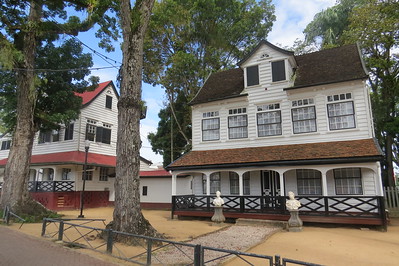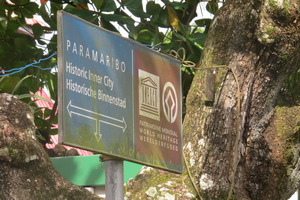Paramaribo

The Historic Inner City of Paramaribo shows the fusion of Dutch colonial architecture and indigenous cultural elements
The city was built in 1683 and further extended across marshy land in the 18th century. Most of its residences are built entirely in wood and are very vulnerable to fires. Notable public buildings include Fort Zeelandia, the Presidential Palace, the neoclassical Reformed Church and the gothic revival Roman Catholic Cathedral.
Community Perspective: the relatively small core zone is located along the left bank of the Suriname River, centered around the street called “Waterkant”. It’s best explored on foot, and you’ll find a number of high-quality colonial buildings that are unique in the Caribbean world.
Map of Paramaribo
Community Reviews
sjoerd nienhuys
We found the old timber colonial buildings a very interesting architecture. Several buildings have been beautifully restored, but some buildings are in process of strong deterioration, such as some government buildings (e.g. the Ministry of Housing!!!, the police HQ). Some good guide books are available in local bookshops, but also guided tours are available. Unfortunately reinforced concrete and cement block buildings are being developed. There are signs that the technology of climatologically suitable timber constructions are being revived, using better construction methods, thermal insulation and soft-timber conservation methods. Pity.
Els Slots

Paramaribo is a large, sprawling city. I explored it on foot during my first day here in Suriname. As my guesthouse was located on the outskirts of town, I had to walk quite a bit in the constant dry heat. There are a lot of cars and buses on the roads, it all seemed relatively prosperous and lively. It took me about 40 minutes to reach the “Waterkant”, the stretch near the Suriname River where the area with the best quality colonial buildings starts. Along the way, in the commercial city center, there are some old wooden buildings too, but these are dilapidated and almost hidden among the gold jewellers, the casinos and the Chinese supermarkets.
The historic core zone is also blessed with quieter, leafy streets. The wooden mansions, all white, are of a size that could only have belonged to wealthy colonials or government buildings. Here also lies Fort Zeelandia – a very small fortress in the typical Dutch style. The surrounding officers' houses in my opinion are the greatest examples of the wooden architecture of Paramaribo. This whole area is in a brilliant state of conservation by the way.
I was the first to enter Fort Zeelandia that day. They had no change available yet to break my 50 Suri dollar bill, but the friendly man on guard waved me in and said I could pay later when I left. The inner court of the Fort looks unbelievably Dutch, thanks to the use of red brick I guess. The Fort now holds a museum, with a few simple but entertaining exhibition rooms.
North of Fort Zeelandia lies Independence Square. The central square itself was fenced off, maybe in preparation for the coming national holidays and festival, or because of restoration purposes, I don’t know. Fortunately, I could still walk on the surrounding road, and admire the grand Presidential Palace and the Ministry of Finance (a classical brick building with a clock tower, not unlike Independence Hall in Philadelphia). A bit further north lies the Cathedral, almost the only building in the historic area that isn’t white. Yellow and blue-grey are its colours, and it’s all made of wood. Together with the cathedral of Georgetown (Guyana), which I hope to visit in a few days, it’s the largest structure of its kind.
I really enjoyed my walk around Paramaribo – it’s a hassle-free and friendly city, with a large number of high-quality colonial buildings that is unique in the Caribbean world.
Read more from Els Slots here.
Arun G. Jairam
Paramaribo is one of the most beautiful and excited cities in south america. It has a great history. Which can be seen by the streets and houses. Its a small city, but with great people from different origines (hindi, creool, javaans, chinees, indiaan, bosneger, europeanen). Further more it has wonderfull jungle areas and sightseeing places, like new nickerie. The food/drinks are great.
I think everybody should have visit Suriname for one time it his/hers life. The climate is warm with a cool breeze. The people are great and welcomes everybody who visits the country. The history of Suriname and Paramaribo is nice and colorfull. It tells about the dutch, britisch, spanisch and portugeese influens during the past centuries. Wonderfull and nice houses, churches, buildings, etc. Go and see for your self. Greetings,
Site Info
Site History
2002 Inscribed
1999 Deferred
Bureau - for imp of various recommendations
Site Links
Unesco Website
Official Website
Related
In the News
Locations
The site has 1 locations
Paramaribo, the capital of Suriname, is served by direct flights from the USA, Netherlands and Brazil. The Historic Inner City covers a relatively small but easy to find area near Fort Zeelandia.
Connections
The site has 24 connections
Art and Architecture
Constructions
Geography
History
Religion and Belief
Timeline
Trivia
WHS on Other Lists
Visitors
61 Community Members have visited.
The Plaque
 (photo by Els)
(photo by Els)